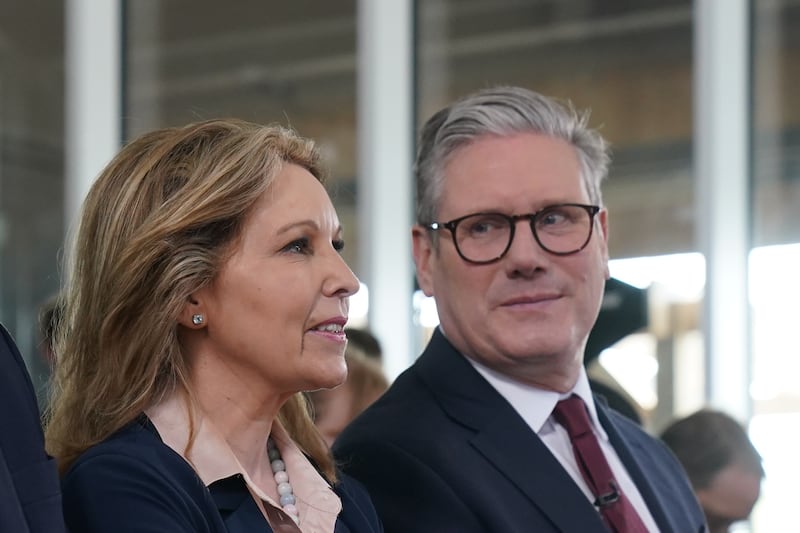The Government could be open to compromises with rebel Tory MPs unhappy with Rishi Sunak’s Rwanda legislation, the new legal migration minister has said.
The Prime Minister will be hoping to persuade hardliners on the right and MPs from the more moderate wing of the party that the plan to revive his flagship asylum policy will work.
Tom Pursglove played down the prospect of a bitter parliamentary battle by saying Tory MPs will back the Bill when it is voted on next Tuesday.
But he was unable to offer a timetable for when the Rwanda legislation would get through Parliament.
Mr Pursglove was touring broadcast studios on Friday to defend the plan, a day after being appointed minister for legal migration when Robert Jenrick’s role was split into two following his resignation in protest at the legislation he believed was doomed to fail.
Amid public displays of deep division over the Bill, Mr Pursglove insisted there was a “unity of purpose on the Conservative benches in Parliament that we need to address this issue” of small boats carrying asylum seekers to UK shores.
“Undoubtedly, there are different views on aspects,” he told BBC Radio 4’s Today programme.
“But I think in terms of that mission, we recognise that these crossings of the Channel are completely unacceptable.”
Signalling ministers’ willingness to engage with those unconvinced by the Bill, Mr Pursglove told Sky: “There will be parliamentary debates, there will be opportunities for people to bring amendments, the House will consider them in the normal way and as ministers we will engage constructively with parliamentarians around any concerns that they have and handle that in the way that we would any other piece of legislation.”
But, ultimately, he said: “I think colleagues will support the passage of this legislation.”
One element adding to some Tory MPs’ unease were warnings by senior lawyers, as reported by The Times, that the legislation remains at risk of failure by allowing migrants to challenge their removal by identifying reasons that Rwanda is unsafe for them personally.
The Tories have broken our asylum system.
Labour will fix it. pic.twitter.com/zZNCaq7tLM
— Keir Starmer (@Keir_Starmer) December 6, 2023
Mr Pursglove, who will not attend Cabinet unlike new illegal migration minister Michael Tomlinson, argued that such individual appeals could only be brought in a “very narrow set of circumstances” and that the new law is “robust”.
“The legislation closes off so many of the grounds that people have come forward with in raising claims about being sent to Rwanda previously,” he said.
MPs will vote on the Bill at its second reading next week, but its next stages are thought to be unlikely to happen before Christmas.
Even if rushed through the Commons, it is expected to face serious opposition in the House of Lords.
Mr Pursglove could not give details on timings, telling ITV’s Good Morning Britain: “You’ve got to have consideration in both Houses of Parliament and that does take some time.
“The whips and the leader of the House will come forward in terms of setting out a timetable by which we will seek to do this.”
I’m blocking the reasons used to prevent flights to Rwanda from taking off.
This emergency law is the only way to make Rwanda work and control our borders. pic.twitter.com/jH0iaODZGw
— Rishi Sunak (@RishiSunak) December 7, 2023
The newly-appointed minister said “it’s not acceptable” for peers to complain about illegal migration “and to then not get in and back measures” to tackle the issue.
Mr Sunak is facing fresh pressure over the beleaguered policy after it emerged the cost of the scheme has already reached £240 million, despite it never being used.
The Government spent a further £100 million in the 2023-24 financial year while flights remained grounded amid a series of legal setbacks, on top of the £140 million previously paid out.

According to a letter from the Home Office to committee chairs, ministers expect a further £50 million cost in the coming year, which would bring the total to £290 million.
Mr Pursglove defended the cost of the plan, pointing to obligations for the UK to ensure “all of the right infrastructure to support the partnership is in place” in the African nation.
“Part of that money is helpful in making sure that we can respond to the issues properly that the Supreme Court raised,” he said.
The Rwanda plan would help bring down the costs of housing asylum seekers in hotels in the UK, he argued.








